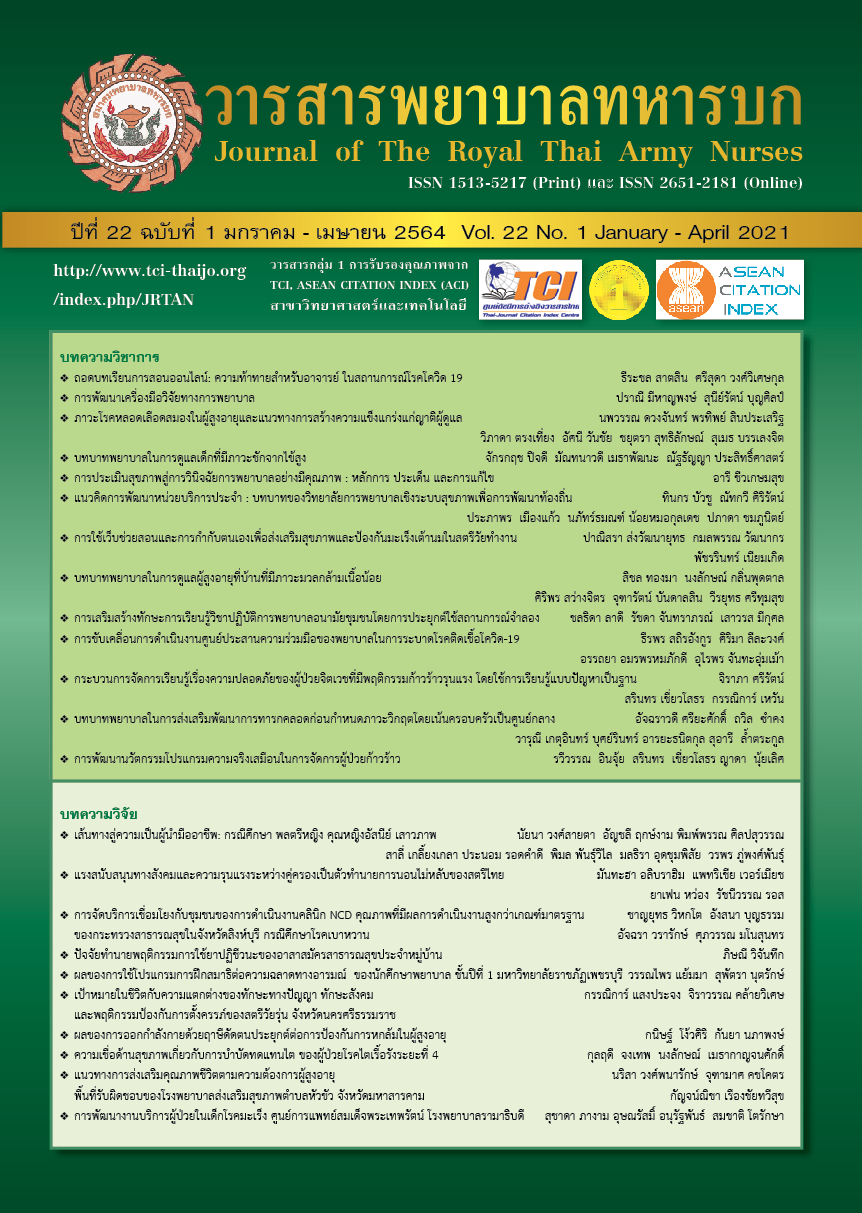The Effects of a Health Literacy Enhancement Program on Health Literacy and Preventive Health Behavior of Prediabetes Type 2 in a Community in Samut Sakhon Province
Keywords:
Health Literacy Enhancement Program, Preventive Health Behavior, Prediabetes groupAbstract
This quasi-experimental research two group pretest-posttest designed aimed to study the effects of a health literacy enhancement program on health literacy and preventive health behavior among adult person with prediabetes Type II. Using purposive sampling, 52 respondents were divided in to an experimental group and a comparison group for 26 respondents in each group. The experimental group received a 8-week health literacy respondents in each group. The experimental group received a 8-week health literacy enhancement program consisted of 1) analysis the skill of reading, knowledge, beliefs, and prior experiences, 2) learning skills development and, 3) knowledge sharing and reflection. The data collecting instruments composed of a set of questionnaire about health literacy and health preventive behavior related to diabetes mellitus Type II. Their reliability were presented KR-20 at 0.96 and Cronbach’s alpha at 0.80. Data were analyzed using descriptive statistics, and independent t-test.
The research results revealed that after the experiment, experimental group had health literacy mean score higher than before the experiment and also higher than comparison group significantly. They also had food consumption preventive behavior mean score higher than before the experiment at significance level of 0.05.// The recommendation is nurse practitioners should apply this program to be nursing instrument for behavioral modification among adult workers to decrease new cases incidence of diabetes mellitus.
Downloads
References
Sriwanichakorn S. Management of chronic diseases in the community. In the 7th “Community health system development forum”, 27 March 2012. National health building Ministry of Public Health. Nonthaburi province: T B P; 2012: 5-19. (in Thai).
International health policy development agency NCDs situation report, health crisis, social crisis, Nonthaburi: international health policy development agency; 2014. (in Thai).
Aekplakorn W. Report of the 5th Thai Health Survey by Physical Examination 2014. Nonthaburi: Health System Research institute. 2014. (in Thai).
Ministry of Public Health: HDC. Standard report group-screening. public health office. 2019.
American Diabetes Association. Classification and diagnosis of diabetes: standards of medical care in diabetes-2019. Diabetes Care. 2019; 42(1): 13-28.
World Health Organization. Preventing chronic diseases a vital investment: WHO global report. Switzerland: Robert Constandse, Raphaël Crettaz; 2005.
Al Sayah F, Majumdar SR, Williams B, Robertson S, Johnson JA. Health literacy and health outcomes in diabetes: A systematic review. J Gen Intern. 2012; 28(3): 444–452.
Chiangkhong A, Duangchan P, Intarakamhang U. Health literacy in diabetic adult: experience of diabetic patient and perspective on health literacy. KJN. 2017; 24(2): 162-178. (in Thai).
Cavanaugh K, Huizinga MM, Wallston KA, Gebretsadik T, Shintani A, Davis D, et al. Association of numeracy and diabetes control. Ann Intern Med. 2008; 148(10): 737-746.
Sarkar U, Karter AJ, Liu JY, Moffet HH, Adler NE, Schillinger D. Hypoglycemia is more common among type 2 diabetes patients with limited health literacy: the Diabetes Study of Northern California (DISTANCE). JGIM, 2010; 25(9): 962-968.
Egbert N, Nanna K. Health literacy: Challenges and strategies. OJIN. 2009; 14(3):
Baker DW. The meaning and the measure of health literacy. J Gen Intern Med. 2006; 21(8): 878-883.
Shrestha A, Singh S, Khanal V, Bhattarai S, Maskey R, Pokharel P. Health literacy and knowledge of chronic diseases in Nepal. HLRP: Health literacy research and practice. 2018; 2(4): 221-230.
Riangkam C, Wattanakitkrileart W, Ketcham A, Sriwijitkamol A. Health literacy, self-Efficacy, age and visual acuity predicting on self-care behaviors in patients with type 2 diabetes. NURS SCI J THAIL. 2016; 34(4): 35-46. (in Thai).
Chaowai TS, Nimitarnun N, Roojanavech S. The effects of health literacy enhancement program for the new case diabetes mellitus type II patients in community. CHJ. 2019; 44(1): 25-34. (in Thai).
Indhraratana A. Health literacy of health professionals. JRTAN. 2014; 15(3):174-178. (in Thai).
Intarakamhang U. Health literacy: measurement and development. Bangkok: Sukhumwit Printing. 2017. (in Thai).
Choeisuwan V. Health literacy: Concept and application for nursing practice. Royal Thai Navy Medical Journal. 2017; 44(3): 183-197. (in Thai).
Petprayoon S, Wattanakitkrileart D, Pongthavornkamol K, Peerapatdit T. The influence of perceived severity, health literacy, and family support on self-care behavior of patients with type 2 diabetes mellitus. CUNS. 2014; 26(1): 38-51. (in Thai)
Sirisuwan P. Effects of health promotion programs for prevention new case of diabetes mellitus in a diabetes risk group in Singkok sub-district, Kasetwisai district, Roiet province. BCN Surin, 2018; 8(1): 45-58. (in Thai)
Bailey SC, Brega AG, Crutchfield TM, Elasy T, Herr H, Kaphingst K, et al. Update on health literacy and diabetes. Diabetes Educ. 2014; 40(5): 581–604.
Downloads
Published
How to Cite
Issue
Section
License
บทความหรือข้อคิดเห็นใดใดที่ปรากฏในวารสารพยาบาลทหารบกเป็นวรรณกรรมของผู้เขียน ซึ่งบรรณาธิการหรือสมาคมพยาบาลทหารบก ไม่จำเป็นต้องเห็นด้วย
บทความที่ได้รับการตีพิมพ์เป็นลิขสิทธิ์ของวารสารพยาบาลทหารบก
The ideas and opinions expressed in the Journal of The Royal Thai Army Nurses are those of the authors and not necessarily those
of the editor or Royal Thai Army Nurses Association.






